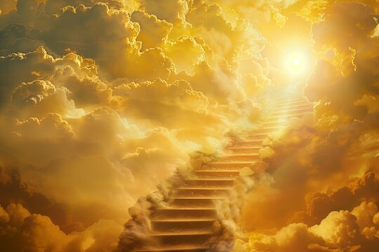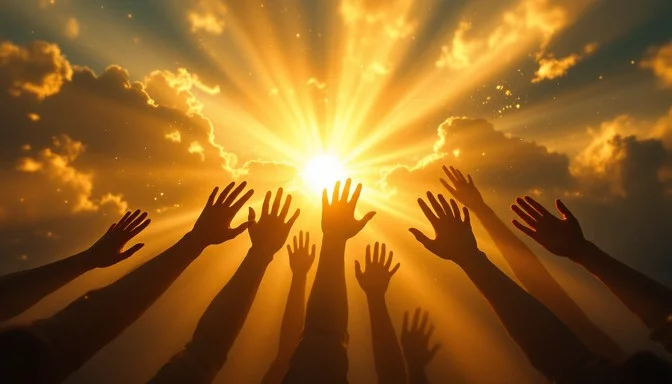In our journey through life, we often see only the surface of things. However each human soul is called to look deeper. Behind every thought, word, and event, there is a hidden spiritual dimension. Our task is to learn how to unmask the evil that hides beneath appearances and to seek always what is true, good, and aligned with Divine Will, the Virtuous Path. This requires discipline, deep self-examination, and a firm desire to grow in holiness.
To unmask evil means to test every thought and action to see whether it comes from God or not. This is not easy. Evil often disguises itself as something harmless or even good. It may appear in the form of pride dressed as self-confidence, laziness disguised as serenity, or envy hidden under the name of justice. The devil does not always use violence or clear hatred; he often uses confusion, distraction, and lies. He attacks our minds with doubts and our hearts with temptations. That is why we must look into ourselves deeply and wisely. We must not let any thought or feeling pass without being tested. Is this idea leading me closer to God or away from Him? Does this action reflect God or the darkened world?
This work of constant examination is not to become proud or to think we can be like God, but to belong more fully to Him. We are not trying to replace Him but to reflect His Light. As human souls, we are called to strive for spiritual purity—not perfection in the worldly sense, but a heart that truly seeks God above all. We must learn to deny ourselves when our desires lead us away from holiness, and instead choose what is right, even when it is painful. This inner battle, this intransigence with ourselves, is how we polish our soul and our spirit to become more transparent on Heaven.
Besides, Saint Paul writes that our real enemies are not people of flesh and blood, but “the powers of this dark world and the spiritual forces of evil in the heavenly realms” (Ephesians 6:12). These demonic forces attack us physically, psychologically, and spiritually. They sow division in families, promote addiction and despair, and whisper lies into our hearts that we are worthless, alone, or beyond forgiveness. They want to block our spiritual evolution and keep us far from the Virtuous Path to Heaven. But we are not defenseless.
Saint Paul tells us to put on the full armor of God. This armor is spiritual and powerful. Truth is our belt—it keeps us upright. Justice is our breastplate—it protects our heart. The Gospel of Peace is our foundation—it guides our steps. Faith is our shield—it protects us from doubt and temptation. Salvation is our helmet—it guards our mind. And the Word of God is our sword—it fights lies with Divine Truth. Prayer is what keeps all this armor strong. We must pray at all times, not only for ourselves, but for all humans.
Therefore, Satan and his demonic forces do not simply seek to cause discomfort or temporary hardship; their true mission is total destruction—physical, psychological, and spiritual. These entities operate with subtlety and intelligence, often hiding behind what appears ordinary, pleasurable, or even harmless. Their ultimate aim is to prevent the soul from reaching union with the Divine, to stop our evolution toward Light, Truth, and Love. They do this by acting on all dimensions of human existence.
Physically, demons rarely intervene in direct, visible ways, but their influence can guide individuals toward choices that damage or destroy the body, which is itself a sacred vessel. They lead people into addictions—alcohol, drugs, excessive consumption of food, and other compulsions—because such behaviors weaken the will and dull the conscience. They encourage forms of extreme hedonism, seducing the body with pleasure to the point where it becomes enslaved to desire and unable to act freely. Sometimes they push toward the opposite extreme: self-neglect, a rejection of self-care that may arise from laziness, burnout, or even the belief that one's body is unworthy of love or attention. Violence is another powerful tool: demons stir up hatred and anger in hearts, which then spill into abuse, war, and cruelty. Domestic violence, murder, and physical conflict often have spiritual roots. Even distraction through constant comfort—passive entertainment, overindulgence in sensuality, or the obsession with superficial appearances—can serve their goals, as it lulls the soul into sleep and inactivity.
Psychologically, demons are especially cunning. The human mind, being the link between soul and body, is a central battlefield. Demonic forces are masters of suggestion. They plant lies in the form of intrusive thoughts: "You are worthless," "You will never change," "There is no hope for you." These thoughts often arrive in moments of fatigue or weakness and, if believed, take root in the heart. They inflate fear and anxiety, exaggerating risks and feeding paranoia, until a person becomes paralyzed and unable to trust life or God. Depression and despair are often exploited and/or caused by demonic presence, as demons capitalise on a person’s wounds, losses, and trauma to whisper: "There is no meaning, no redemption, no way out." They confuse identity, not just in terms of gender or role in society, but in a deeper spiritual sense—twisting one’s perception of self-worth, morality, and purpose. This confusion leaves people lost and vulnerable to manipulation.
Another common tactic is isolation. By sowing seeds of mistrust, suspicion, or even false independence, demons pull individuals away from families, friends, and spiritual communities. Isolation weakens us, because Love and Truth grow in relationship. Pride is often used as a mask: they convince us we don’t need anyone, that we’re better off alone, or that no one understands us. This creates spiritual blindness. Interestingly, demons use both extremes: they may inflate the ego until someone becomes arrogant, or crush it until one is stuck in deep self-hatred. Both are equally destructive. They destabilise the personality and block the person from finding interior peace and harmony.
But the most dangerous level is spiritual destruction, which is the very core of their mission. Here, the attack becomes existential. Demons tempt us to sin repeatedly, knowing that frequent sin dulls the conscience and forms habits. Over time, those habits become vices—chronic patterns that enslave the soul and create distance from the Divine. They use the illusion of harmlessness to justify evil: "It’s not that bad," or "Everyone does it." With time, this leads to spiritual numbness.
Another subtle tactic is spiritual pride. As someone begins to grow or practice their faith, demons may inflate the ego, making them feel superior to others. Instead of deepening in humility, the person begins to worship their own image of virtue. They may speak piously, but act without Love. Apathy and lukewarmness are perhaps the most quiet and effective demonic strategies. Many people do not reject God—they just delay prayer, ignore their conscience, or become too busy with distractions. Time slips away, and the soul slowly drifts into coldness without realizing it.
Doubt in God is often encouraged. Demons twist sacred teachings, suggesting that God is unjust, cruel, or distant. This intellectual confusion weakens faith. In some cases, they direct souls toward spiritual practices that are dangerous—forms of occultism, divination, or “light spirituality” that look harmless but are disconnected from Truth and lead toward false gods or energies. They may even offer a form of "false peace"—a calmness that comes from avoiding Truth and indulging in sin—which deceives the soul into thinking all is well, when in fact, it is asleep and vulnerable.
Finally, when someone begins to truly convert, to walk the Path of Light, that is often when the most brutal attacks come. Exhaustion, temptation, and discouragement increase. The demons know that spiritual rebirth threatens their control, so they try to strike the soul down with thoughts like: "It’s useless," "You haven’t changed," or "You’ll always fall back." They want the soul to give up just before it blossoms.
Yet, despite the depth of their attacks, these forces are not invincible. They are limited, and they flee in the presence of True Light, Love, and Humility. The Divine has given us all the tools to resist them. Recognizing their strategies is the first step in breaking their power. Through constant awareness, prayer, purification, and acts of selfless Love, the soul regains strength. Demons cannot stand in the presence of real holiness. Every small choice for Truth, every act of forgiveness, every effort to rise after falling, weakens their grip and brings the soul closer to its true destiny: union with the Divine.
And what about those who oppose us in the world? We must remember: every human is created by God and is capable of salvation. Even those who hate or hurt us are not our true enemies. We must pray for their conversion, not hate them. We must thank God for them, because they test our love and help us grow in patience and virtue. Every time we suffer for doing good, we are walking in the footsteps of God, and we are earning treasures in Heaven.
There is also a higher solution: the restoration of lost harmony between Heaven and Earth. This harmony—called kosmos in ancient Greek—was part of the original Beauty of Creation. We must return to it by building a relationship between the Celestial and the earthly, between Angels and human beings, between God and His human creatures. This is not imagination. It is possible through Love. Every prayer, every kind action, every small sacrifice filled with Love helps to bring this Harmony back. The more we act with sincere Love, the more we call upon Heaven to help Earth.
So how do we recognise and resist the demonic strategies meant to destroy us?
1. Distraction and noise: Evil uses constant noise—social media, gossip, shallow entertainment—to stop us from thinking deeply. We must create silence in our lives to hear God.
2. Fear and despair: Evil whispers that we are alone or doomed. But hope in God is stronger than any fear.
3. Pride and selfishness: Evil tells us to serve ourselves first. We must learn humility and serve others, as Jesus did.
4. Confusion and Relativism: Evil says there is no truth. We must stand on the Word of God, which is Eternal and Unchanging.
5. Temptation through Pleasure or Pain: Whether through comfort or suffering, the devil tries to weaken our will. We must stay close to God, with prayers, practice of Virtues and good deeds.
To grow spiritually, we must stay close to the Light — that is, to what is True, Good, and Just. This means being honest with ourselves, acknowledging our faults, and working daily to become better. It involves practicing Mindfulness, Compassion, Self-discipline, Altruism, and other Virtues, doing good deeds, staying connected to a community that shares our values, and acting with love toward all beings. Through prayer, meditation, reflection, practice of Virtues, acts of kindness, the more we choose Truth and Love, the less power negativity, hatred, and darkness have over our lives.
In the end, evil may be strong, but God is infinitely stronger. Light always defeats darkness. We are not alone in this fight. Angels fight beside us. Saints pray for us. And Christ walks ahead of us, showing the way. Our task is to keep going, always rising again, always choosing Love, always turning our face toward Heaven.




.png)




.png)








